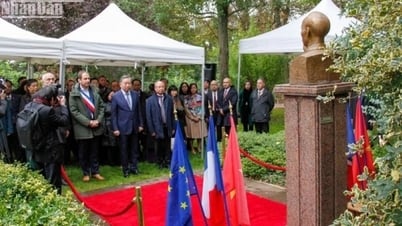Thousands of far-right supporters marched in Warsaw, calling on Poland to be ready to leave the EU if the union adapts existing treaties.
About 40,000 Poles carrying national flags, some lighting flares, marched along the route from the center of Warsaw to the national stadium on November 11, Warsaw authorities said. The event is held annually on Poland's national day.
Polish media estimated the number of people participating in the march at around 90,000. They shouted anti-European Union (EU) slogans and carried banners calling for "Polexit", a phrase referring to Poland's exit from the EU, similar to Britain's Brexit.
“If the European treaties are changed, Poland must be ready to leave the EU,” said Marcin Kowalski, leader of the far-right All-Polishi Youth group, warning that the changes would turn the EU into a “euro-federal union” led by the European Commission.

Protesters take part in a Independence Day march in Warsaw, Poland on November 11. Photo: AFP
The event comes less than a month after Poland held parliamentary elections. The ruling right-wing Law and Justice (PiS) party received the most votes, but did not have enough seats to form a government. PiS is considered to have difficulty finding partners to form a coalition.
Meanwhile, the opposition Civic Coalition (CC) led by former EU leader Donald Tusk finished second but joined forces with two centrist parties to win 248 seats in the 460-seat parliament. Mr Tusk has pledged to restore good relations with the EU, which have deteriorated since PiS came to power in 2015.
The right-wingers say the election results will undermine Poland's independence. Bartosz Malewski, leader of the Independence March association, predicted in October that changes to EU treaties were likely. "This will affect Poland's sovereignty and independence in the international arena and in the EU," Malewski said.
Grzegorz Cwik, a member of the nationalist Niklot association, said he was concerned about "federalisation of the EU, cuts in military spending and the elimination of social programmes".
The European Parliament is considering more than 200 changes to EU treaties, including controversial ones that would remove member state vetoes and give EU institutions more policy-making power in some areas.
Poland's EU affairs minister Szymon Szynkowski vel Sek warned in late October that these changes would threaten many areas of life.
Nhu Tam (According to AFP, Al Jazeera )
Source link


![[Photo] Party and State leaders visit President Ho Chi Minh's Mausoleum](https://vphoto.vietnam.vn/thumb/1200x675/vietnam/resource/IMAGE/2025/5/19/d7e02f242af84752902b22a7208674ac)

![[Photo] Special flag-raising ceremony to celebrate the 135th birthday of President Ho Chi Minh](https://vphoto.vietnam.vn/thumb/1200x675/vietnam/resource/IMAGE/2025/5/19/1c5ec80249cc4ef3a5226e366e7e58f1)

![[Photo] Party and State leaders attend the special art program "You are Ho Chi Minh"](https://vphoto.vietnam.vn/thumb/1200x675/vietnam/resource/IMAGE/2025/5/18/6895913f94fd4c51aa4564ab14c3f250)




























































































Comment (0)